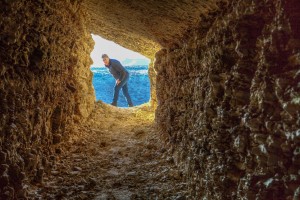Uncontrolling Resurrection Love
What might it mean to think a thought whole?
This weekend is most significant in the Christian calendar. Christians celebrate the crucifixion and resurrection of Jesus Christ.
When we Christians look at the crucifixion, it’s not difficult for us to believe that Jesus’ death reveals the uncontrolling love of God. In his letter to the church in Rome, the Apostle Paul put it this way: “God demonstrates his love for us in that while we were yet sinners, Christ died for us.”
In his letter to Christians in Philippi, Paul says Jesus “took the form of a servant” and “humbled himself” in his “death on the cross.” Jesus’ kenosis tells us something true about the self-giving, others-empowering, and therefore uncontrolling love of God.
But what about uncontrolling love at the resurrection?
When “God raised this Jesus to life,” as the Apostle Peter put it, did God set aside love and use overpowering coercion? Can we believe Jesus’ resurrection was also accomplished through the self-giving, others-empowering and uncontrolling love of God?
Can we believe Jesus’ resurrection was accomplished by the uncontrolling love of God? Share on XIn my 2010 book, The Nature of Love, I proposed a way in which God could resurrect Jesus through uncontrolling love rather than coercive control. This way involves the cooperation of Jesus’ body and spirit.
I’ve been thinking more about these issues as I await Easter morning. A new insight about God’s love and the resurrection emerged while I was reading Paul’s letter to the church in Ephesus. Paul writes these words:
“Because of his great love for us, God, who is rich in mercy, made us alive with Christ even when we were dead in transgressions—it is by grace you have been saved” (Eph. 2:4-5).
This passage says God’s love makes believers alive. We who were once dead in sin can be brought to life in Christ. God’s grace can save us, and we can be resurrected with Christ!
Like John Wesley, I think salvation is initiated by God but requires our cooperation. “God will not save us without ourselves,” as Wesley put it. We must respond freely to God’s gracious gift. In short, God awaits our “yes” before we are resurrected.
Perhaps just as our resurrection from death in sin requires cooperating with God’s work, so also Jesus’ resurrection from death involved his cooperating with God’s work.
Just as our resurrection requires our cooperation, so Jesus’ resurrection requires his cooperation. Share on XIf so, we might be able to think the thought whole. That is, we can believe that God never controls and always loves. Instead of expressing uncontrolling love only in Jesus’ death, God also expresses such love when resurrecting Jesus. The whole of God’s activity is love that does not control.
That’s what I’m thinking as I await Easter morning!

Comments
[…] – See more at: https://thomasjayoord.com/index.php/blog/archives/uncontrolling-resurrection-love#sthash.pqiZXhnk.dpu… […]
This is truly a beautiful reminder of just how wondrous a life lived hand in hand cooperating with God can and really should be. I believe that was what Jesus exampled as He walked this earth.
We can get caught up in the power aspects of the gospel story as the disciples did as they walked with Jesus. They got caught up in wanting the first place next to Jesus. What they forgot and sadly so do we that the choicest place next to Jesus is exactly where our God wants us to be, not some of us or just those few, but every one of us. God wants us all to draw near to Him and know the blessed love walk we are all meant to journey on with our God. Its not about the power we get. It is all about the love of God enveloping us, showing us that our lives are meant for beautiful cooperation with our God. Our God loves us beyond what we can think, dream or imagine. It is wondrous and we will miss it if we do not just simply walk hand in hand with our God letting Him love us as He enjoys how we love Him!
Harmony was the metaphor that came to mind while reading this post. Our western idea of musical harmony, for example, though limited by the scale we use, offers a wide variety of agreements producing sounds very pleasant to a western cultured ear. The full harmonies shown by groups like the Tallis Scholars (see the sample Kyrie at http://www.gimell.com/recording-perfect-polyphony.aspx) illustrate this well.
Following on from scientifically understandable examples like this, we can at least imagine the innumerable ways our will might harmonize with God’s will. This imagined harmony of Creator and created, the divine and icons of the divine, is powerful beyond our understanding. Perhaps this harmony metaphor can also help us glimpse the possibilities of love’s efficacy within the Trinity. From there, we are encouraged to reach out toward the possibilities that can become realities when we let the Spirit of God join us with Christ and others more closely through His love, which is also His will.
I am currently reviewing New Testament scholar Raymond Brown’s masterpiece, “The Death of the Messiah”, a scholarly commentary on the four Passion stories in the Gospels. I welcome any input:
https://lutherwasnotbornagaincom.wordpress.com/2017/12/22/new-testament-scholar-raymond-brown-the-authorship-and-the-dating-of-the-gospels/